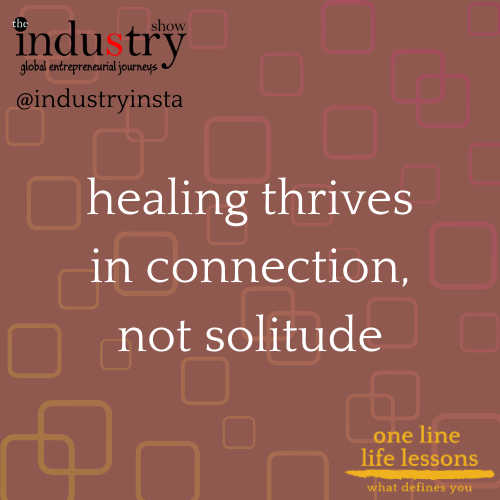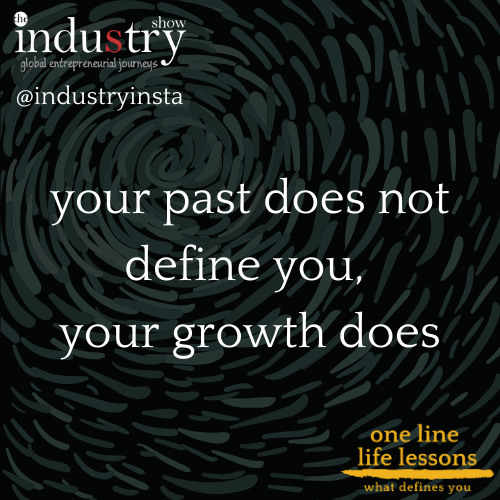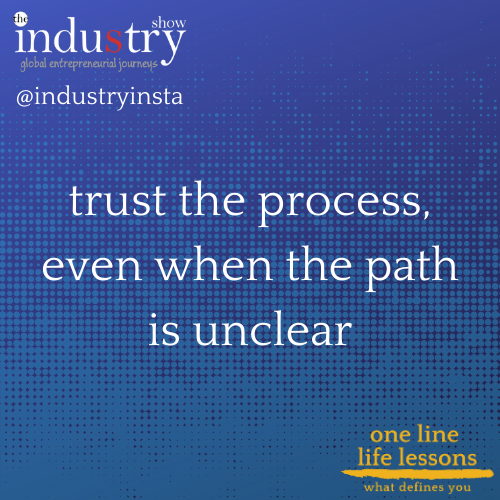Aug 3, 2024
Ektha
Aggarwal
Ektha Aggarwal is a seasoned psychotherapist and the CEO and founder of Shakti Therapy, a holistic therapy practice based in Los Angeles. With a diverse cultural background and personal experiences across various continents, Ektha is dedicated to providing culturally competent and spiritually integrated therapeutic services. Her professional journey includes a focus on addressing the mental health needs of people of color, particularly within South Asian and Middle Eastern communities. Ektha is also the founder of Jiva Mental Health, a nonprofit organization aimed at supporting South Asian mental health across the U.S. She combines her expertise in psychotherapy with a commitment to community-building and holistic healing.
One Line Life Lessons from Ektha





Episode Highlights
- [00:00:00] Nitin Bajaj welcomes Ektha Aggarwal to the show.
- [00:00:15] Who is Ektha Aggarwal?
- [00:01:22] Shakti Healing Motivation
- [00:02:48] Shakti Therapy Impact
- [00:04:05] Importance of Cultural Relatability
- [00:05:34] Major Challenge
- [00:08:21] Exciting Opportunity
- [00:10:17] Rearview Mirror: Lessons Learned
- [00:14:44] De-stressing and Fun Activities
- [00:16:13] Recommended Books
- [00:18:05] One-Line Life Lessons
- [00:19:34] Closing Remarks
Show Transcript
Transcript - Full Episode
[00:00:00] Nitin Bajaj: welcome to the industry show. I’m your host, Nitin Bajaj. And joining me today is Ektha Aggarwal. Ektha, welcome on the show.
[00:00:08] Ektha Aggarwal: Thank you. It’s such a pleasure to be here today, Nitin.
[00:00:11] Nitin Bajaj: It’s great to have you here. So let’s start with who is Ektha?
[00:00:15] Ektha Aggarwal: Gosh, I love this question. I’ve been hearing a lot of your podcasts. And I would say that the sole purpose is to feel every single emotion and to help others embrace their emotions through difficult times and through happy times. I am a ceremonialist, a Muay Thai practitioner, a living room dancer, but nobody needs to know about that one. A proud sister and daughter of first generation South Asian from Tanzania. I’m a psychotherapist and a CEO. And Ektha means unity. So I’m a connector and I love to bring people together.
[00:00:54] Nitin Bajaj: And sounds like you also unify a lot of your own spheres of both influence and things you influence. So looking forward to getting to know a little more about you. Let’s start with Shakti healing, before we go into what it is, I’m curious to learn why do this? And amongst the many other options you had at your disposal, why this and why now?
[00:01:22] Ektha Aggarwal: Yeah, I have grown up with a just a very colorful past moving from Tanzania to London to the States. I’ve seen so many different cultures and. Human behaviors and moving here at a very young age and experiencing bullying for having a British accent, which now I so regret I don’t have, all of those things really shaped who I became and then going to college and understanding how so many females, including myself, had this like double standard of dressing one when being one person at school and then being a whole different person at home. And then also just seeing what the Immigrant experience has been, there’s just so much pride, but there’s a lot of struggle and resilience it takes to get there and all of that accumulated. in being South Asian. And so when I started to do my own therapy in college, I just realized there was no one like me, no one that had my skin color, that understood my cultural experience, my spiritual experience. So I became really motivated to create a space for others who looked like me and felt like me, hence Shakti Therapy.
[00:02:34] Nitin Bajaj: Love it. Tell us a little more about the impact which could, you could talk about the reach, the size, the geographies, and the kind of people you help through the work in the workshops you do.
[00:02:48] Ektha Aggarwal: Yeah, absolutely. So Shakti Therapy is a holistic group. Practice based in Los Angeles. So we’re able to serve everyone in California and by practice. What that means is there are multiple therapists and one of the requirements is you have to speak a certain length, a second language, and have an ethnic background that you identify with. So we have folks who are Asian American, middle Eastern. And so when clients come in, there’s this. cultural relatability that they’re experiencing with their therapist. Doesn’t feel like you’re speaking to someone who doesn’t understand you. So though we are limited by license to only serve California, one of the big reaches that we have outside of our license is the spiritual work that we do. It is a holistic practice. And so a lot of the spiritual workshops that we have, we can serve anyone in United States. And so I have folks from New York, from Florida, who come to see me for psychedelic therapy, for example, because that’s not regulated by state lines. And we serve all of people of color with focus on South Asians and Middle Easterns and Asian American
[00:04:05] Nitin Bajaj: love that. I especially love that. In addition to the technical certifications and what have you you have that additional level of. Of having that ethnic, not just background, but identity and the ability to connect with someone who has a similar identity is so important, especially in the line of work you are in
[00:04:29] Ektha Aggarwal: absolutely. I think it’s when we think about healing, we always think about healing the brain or the body. And we quickly forget. That there’s this sense of interconnectedness in our well being, and that’s the idea of Shakti, right? It’s this power that’s so innate in each and every one of us, and it is the catalyst for change and the thing that’s responsible for creation. And when we can awaken that part of us, we don’t only just heal the mind and the body, we really are healing this holistic concept of community and culture. And we recognize that how action and spirit are deeply intertwined. And so we’d like to bring some of that philosophy into the work that we do.
[00:05:14] Nitin Bajaj: I love that. At the same time, I’m thinking this is Not easy work, because you’re really having to get people to agree, accept and commit. So I’m curious to hear, what is the one big challenge you face?
[00:05:34] Ektha Aggarwal: Yeah, that’s a really good question. I might pivot a little bit and answer that as a personal challenge because it does come out into my work. Sure. Who I am as a person is what is showing up at work. And a personal challenge that I face is this idea of acceptance. It is a universal challenge that a lot of my clients also face. And I really struggle between leaning into accepting myself first accepting this notion of what others want out of me and being a South Asian woman. There’s just a lot of expectations on. This is how you’re supposed to be. If you’re brown, this is how you’re supposed to be. If you’re a woman. These are the timelines that you’ve had to follow and I’ve grown up in a community that’s taught me that it’s more important to be accepted by others first to accept yourself. And we see this in the concept of like low care, paying gay, or like bringing shame on the family unit. And so you want to protect that. And to protect that you do what pleases other people, you do what other people’s timelines have shown is acceptable. And, in protecting those parts of me, what I’ve realized, and I’m still realizing is I’m not true to myself. And I show up as a strong person. And someone who has it all together. But the truth is I’m broken. And in a very real way, we are all broken. And we don’t have to be enough for everyone to be enough for ourselves. And that’s been something that I’m learning that if we start to accept ourselves, we start to see ourselves as enough. Then we would learn to love all parts of us and all parts of us, even the broken ones and the good ones are beautiful. And that’s what makes us human, right? The flaws and all.
[00:07:30] Nitin Bajaj: I love how you beautifully put it together. And yeah, I agree that a lot of this shows up in the work as you’re talking to people, as you’re going through that process, number one is accepting who we are. That gives us, I would say a good starting point. To say this is where I want to go from here, but I’m okay with who I am and everything else from here on is an improvement and getting better and not measuring me comparing that with somebody else’s expectations, but just having my own and knowing that I want to be and who I want to be. So I love that. Thank you. Now on the flip side of challenges come opportunities. And I would love for you to share what’s the most exciting one that you have in front of you right now.
[00:08:21] Ektha Aggarwal: Yeah. I’m a big vision board person. So five, six years ago, when I was making my vision board, I thought, gosh, it would be so nice to start a nonprofit. I know nothing about nonprofits back then. And I just post this on my vision board and I let it go. And late last year, out of nowhere, I just got this idea or throwing an event for South Asian specifically. And. Fast forward today, it’s what’s worth it, Jiva Mental Health, and that’s my South Asian mental health nonprofit that serves all of the United States. And, I look back and it just, It’s a passion project. It brings me so much joy and I find myself spending hours on it. The beauty of this is, yes, it’s therapy, but it’s so much more. I get to incorporate this idea of play and celebration into learning and creating healthy coach. So an exciting opportunity that’s coming up is we’re having our second annual gala in October. And these galas are these big and we have these vulnerable panels where not experts are talking, but people who’ve gone through real life experiences for many, it’s their first time coming out and sharing their experience with the world. And our last event, you could see South Asians in tears and present and that’s not a common sight for our community. And so we take that and at the end we celebrate. Research has shown that when you incorporate play and celebration, we absorb 54 percent versus 29%. And this is why kids are sponges because they’re always playing and laughing and celebrating. And so this passion project for me is just such an exciting moment where I get to see all of that at work.
[00:10:17] Nitin Bajaj: That’s amazing. First off, congratulations on Jiva again. It’s
[00:10:20] Ektha Aggarwal: a
[00:10:21] Nitin Bajaj: beautiful initiative. And also super excited for the upcoming second gala in October. And would love to collaborate, participate and help make Jiva even more successful. Gosh,
[00:10:36] Ektha Aggarwal: thank you. We’d love to have you there and part of it in any and every way.
[00:10:41] Nitin Bajaj: Awesome. Now, as we look forward, I want to take a pause. Look in the rear view mirror and ask you to share two moments in life where in one things did not work out as you had expected, and there were lessons and another one where things blew your own expectations and became a success beyond what you had imagined it would be.
[00:11:05] Ektha Aggarwal: Yeah. A lesson I’ve learned that’s. Pretty hard to share is, a powerful one for me. It’s, as I mentioned, we really grow up with this idea of you’ve got to have it together. You’ve got to be perfect. And this image of perfection and strength is really the worst thing you can do for yourself. At a young age, you’re told man up, big girls. Don’t cry, whatever it is. We’re taught that concealing these bottom level emotions is how you get ahead. It’s how you become successful. And as I mentioned, it’s left me disconnected. But the other part to that is I lost so many friendships here. I thought, being a good friend is being there for someone all the time. And what I didn’t realize is a lot of my friends, maybe seven, eight years ago, came up and told me, Hey, listen, you’re a good friend and you don’t let us be a friend to you. You never have problems. You never want us there to support you. And I was in shock because they. That didn’t feel right, but that’s what I was portraying and friendship really is gifting vulnerability. And I realized that and it’s been such a hard lesson because I’ve lost so many people and it takes authenticity and it takes taking that mask off and saying, Hey, I’m not perfect. I’m not strong. I need you in this moment. So
[00:12:29] Nitin Bajaj: that’s one. Thank you for sharing that. It’s, I’m sure it’s not easy to having lived through those experiences, especially when you realize that it hits you hard to be able to share that openly and honestly takes a lot of courage. So thank you for doing that.
[00:12:46] Ektha Aggarwal: Yeah. And I appreciate you just being present for it and holding space. And. Failures teach us lessons. And so I’m so grateful for that. And the other side, the success is when I graduated grad school, I thought I’m going to work, I’m going to provide therapy. And that’s called making it when I entered the county system, I never thought I’d have a business, let alone three. I never thought I’d hire employees in my life. Like none of that existed for me. And one of the concerns my mom had as a child was like, Oh my God, she doesn’t have her head on her shoulder. I’d always forget my backpack at school. I’d never remember the page number for homework. I was this free spirit that just played. And so the worry made sense. And then in grad school, my brother would tease me. He’s Oh, don’t worry. I’ve got the good job. I’ll pay for you. Cause the social work salary was 40 K. Can’t survive with that. And when I look back at my life and how it’s turned out and think about how Shakti therapy is a practice where I have employees and I’m responsible for them, I’m overwhelmed with gratitude, overwhelmed. This was never my journey. This is not what I dreamt. And I feel like it’s literally being guided by God. That’s put me in the space even it’s just the name was dropped on my lap and so it is a big moment of success for me that I hold on dearly.
[00:14:18] Nitin Bajaj: Again, congratulations. And, in many journeys, the opportunity presents itself. You just have to be ready to take it and then go with it and make it a success. So you clearly have done that. Many congratulations on that.
[00:14:33] Ektha Aggarwal: Oh,
[00:14:35] Nitin Bajaj: I’m very curious to know what do you do to de stress, step back, enjoy, and have fun?
[00:14:44] Ektha Aggarwal: I most people don’t know this, but I am a Muay Thai practitioner. I come across very feminine and radiant, but I have this whole like intense masculine side of me. And so I love to get behind a bag in front of a person and I just love to punch and I have a mean punch.
[00:15:06] Nitin Bajaj: All right. So don’t mess with you as the message. Not at all.
[00:15:12] Ektha Aggarwal: So Muay Thai is something I do for fun and I do that three or four times a week. Literally my therapy and I enjoy it fully. I would say, completely on the other side, I am such a plant human. I have a forest at home and over 70 plants. I have no idea how they’re all thriving, but yeah, I just, I love. The idea of taking care of plans and waking up in the morning and checking in and seeing do I have new babies to greet? Yeah. And let’s not forget, that living room dancer Friday nights when I want to stay in, I blast the music, like I’m having a party and it’s a party of one. That’s
[00:15:59] Nitin Bajaj: the best one.
[00:15:59] Ektha Aggarwal: Yes, exactly. Exactly. That’s
[00:16:03] Nitin Bajaj: so good. I’m going to extend this and ask if there are any specific books or podcasts that you listen to that others should know of.
[00:16:13] Ektha Aggarwal: Yeah, so I am very traditional in the sense that I’m not so much of a podcast person. I love holding a book in California winters by the fireplace or sitting at the park during the summer. And there’s three books I will recommend to everybody, regardless of where you are in your mental or spiritual personal development journey. The first one is Attached. It’s by Amir Levine and Rachel Heller. And this book really talks about our relationship patterns and how to create healthier connections in adult relationships. We grow up with our own attachment styles as kids. And so this becomes so important for us to learn and unlearn. The second one, which is a fun read and you may have heard of is the alchemist. And that is all about following your dreams and listening to your heart. It’s this like universal message on self discovery that I, Truly belief can resonate with anyone. And the last one is why Buddhism is true by Robert Wright. This is a pretty dense book. So if you’re going to commit, know that you may be reading and re reading certain sentences over and over, but it’s a fantastic blend between psychology and Buddhism and how to access ancient wisdom. In this modern world. And it gives us really practical tools to apply. So there are my three go to books that literally I skim every year, just to remind myself of the lesson.
[00:17:50] Nitin Bajaj: Thank you for sharing those. And we’ll be sure to include that when we post this video now onto my favorite part of the show, we call it the one line life lessons. We would love to hear what your life lessons are so far.
[00:18:05] Ektha Aggarwal: Yeah. So one liners that I live by is healing thrives in connection, not solitude. This is probably a newer one that I discovered last year and I embody. Another one that I’ve been holding since the last five years is be the voice, not the voiceless. And I think that’s so important, especially as. And we’re taught to be people of color. We’re taught to just silence ourselves and hold it back and as women be in that submissive space. Third one is your past does not define you. Your growth does, and that alludes to the idea that it takes courage to reach out for help and support, and that’s a defining moment. And a personal one is trust the process, even when the path is unclear. The path’s not never defined and it takes us in multiple ways. And lastly, let go and let God in.
[00:19:05] Nitin Bajaj: Awesome. Those are so, I really resonate with every single one of them. And thank you for sharing your journey, your story and these life lessons with us. We really appreciate it again. Congratulations on all the successes so far and wishing you all the best both for Shakti and for Jiva and looking forward to being of help and being a resource for the amazing work you’re doing.
[00:19:34] Ektha Aggarwal: Thank you Nitin for having me here and it was such a pleasure to connect with you and share my story with you.



